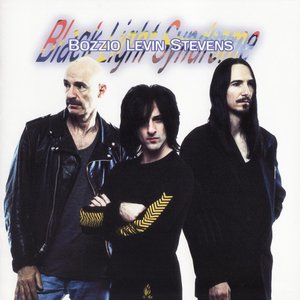
Published on Nov 13, 1997
Jeff Beck, eat your heart out.
You’ve been trying for three decades to make the ultimate
guitar-oriented instrumental album, but you’ve always fallen short
in some aspect. Even when working with such instrument wunderkinds
such as drummer Terry Bozzio, you’ve come close, but haven’t quite
hit the mark.
Well, Jeff, step aside, ’cause Bozzio (who cut his teeth with
Frank Zappa and Missing Persons) has teamed up with two other
virtuosos, Tony Levin and Steve Stevens, and created one of the
most incredible stream-of-consciousness albums I have ever heard,
Black Light Syndrome.
If you think about it, this was a very volatile mixture. Take
one of the premier rock drummers of our time, add in one of the
most in-demand bassists (Tony Levin) and a guitarist who only
recently has earned the respect he deserves (Steve Stevens), and
record an album in only four days with only rudimentary planning of
songs. What could have been disastrous, in fact, turns out to be
one of the best albums I’ve heard all year.
You can tell this is going to be a magical event from the
opening notes of “The Sun Road.” While Stevens’ guitar is often the
leading instrument of the group, Bozzio Levin Stevens is definitely
a gathering of ego-less players. All musical styles and genres are
embraced; each musician is given ample time to step to the front
and display their mastery without showing off. And most of all,
this is what sets it apart from Jeff Beck’s work – it’s not boring
in the least.
The transition from jazz to rock is seamless as “Dark Corners”
kicks in; this song shows just why Bozzio is one of the few people
I would call a master of the drum kit (the other being Rush’s Neil
Peart). But, in all fairness to Bozzio and Levin (who has earned
his stripes with Peter Gabriel and King Crimson), this is Steve
Stevens’ moment to shine. If you, like me, only thought of Stevens
as the guitarist for Billy Idol in his heyday, then you are in for
one hell of a shock. His classical/flamenco work on “Duende” is
powerfully beautiful. If anything,
Black Light Syndrome helps Stevens shed any last vestiges of
being a “hair band” player and puts him in a limelight he
rightfully deserves.
There is not a single weak moment on
Black Light Syndrome. I was prepared to say how I wished
that Levin had been brought out into the mix more often. However,
the more I listened to the disc, the more I heard his influence –
quiet, but just as powerful as his other two bandmates. Check out
the opening of the title track to experience what I mean –
wow!
One might be scared off of listening to this disc because none
of the tracks clock in at under seven minutes, “The Sun King”
coming in at 14:37. My advice: ignore the timer on the CD player,
and just let the songs flow. You’ll be surprised how quickly the
time passes, and how often you’ll find yourself going back to this
disc.
It is rare when I offer high praise about any album, and even
rarer when I can’t stop myself from singing the joys of a
particular work.
Black Light Syndrome is one of those albums – an
instrumental album for even those who hate instrumental work. For
my money, this now ranks as the best release of 1997.